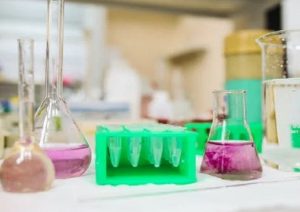The University of Benin (UNIBEN) Faculty of Physical Sciences, Department of Chemistry Courses, Course Codes and Course Credits for First and Second Semester.
Recommended
Chemistry is a subject which cuts across practically every facet of human development. It is the bedrock of most industries and the principal discipline in the technology for the processing of all natural resources; renewable and non-renewable.
UNIBEN 100L First Semester Chemistry Courses
| Course Code | Title | Credit | Status |
| CHM111 | General Chemistry I | 3 | Core |
| CHM113 | Organic Chemistry I | 3 | Core |
| CHM 113 | Practical Chemistry I | 0 | Core |
| MTH110 | Algebra and Trigonometry | 3 | Mandatory |
| MTH112 | Calculus | 3 | Mandatory |
| PHY111 | Mechanics, Thermal Physics and Properties Of Matter | 3 | Mandatory |
| PHY109 | Practical Physics | 2 | Mandatory |
| GST111 | Use of English | 2 | Core |
| GST112 | Philosophy and Logic | 2 | Core |
| PBB 111 | Introduction to plant Biology | 3 | Mandatory |
| Total Credits | 24 |
UNIBEN 100L Second Semester Chemistry Courses
| Course Code | Title | Credit | Status |
| CHM122 | General Chemistry II | 3 | Core |
| CHM124 | Organic Chemistry II | 3 | Core |
| CHM122P | Practical Chemistry I | 0 | Core |
| MTH125 | Differential Equations and Dynamics | 3 | Mandatory |
| PHY124 | Electromagnetism and Modern Physics | 4 | Mandatory |
| GST121 | Use of English II | 2 | Core |
| GST122 | Nigeria People and Culture | 2 | Core |
| GST123 | History and Philosophy of Science | 2 | Core |
| PBB 122 | Introduction to plant Biology | 3 | Mandatory |
| Total Credits | 22 |
CHM 111 General Chemistry 1 (3 Credits)
a) Relationships of chemistry to other sciences. Atoms, subatomic particles, isotopes, molecules, Avogadro’s number. Mole concept. Dalton’s theory. Modern concepts of atomic theory. Laws of chemical combination. Relative atomic masses.
b) Introduction to nuclear reactions. Nuclear binding energy, fission and fusion reactions.
c) States of Matter: Gases, gas laws. General gas equation. Liquids and solids. Introduction to the lattice structure. Isomorphism. Giant molecules.
d) Introduction to the Periodic Table. Hydrogen and hydrides. Chemistry of Groups O, I, II elements. Acid-Base properties of oxides.
CHM 113 Organic Chemistry I (2 Credits)
A General introduction
i. Introduction: Definition of Organic Chemistry. Functional groups.
ii. General procedure for isolation and purification of organic compounds.
iii. Determination of structure of organic compounds. Elemental analysis percentage composition, empirical and molecular formula, structural formula.
iv. Isomerism. Structural isomerism and stereoisomerism (Geometrical and Optical).
v. Electronic theory in organic chemistry. Hybridization leading to the formation of carbon, carbon single, double and triple bonds. Hydrogen bonding, electronegativity, dipole moment polarization, bond energy. Inductive and resonance effects.
B. Non-polar functional Group Chemistry
i. Alkanes: Structure and physical properties. Nomenclature: Common ( trivial ) names. IUPAC names of classes of compounds.
i. Substitution actions including mechanism.
ii. Alkenes: Structure and physical properties. Reaction: addition (of H2, X2 HX, H2O, O3, etc). ; oxidation polymerization.
iii. Alkynes: Structure. Acidity of acetylenic hydrogen. Reaction; addition of H2, X2, H2O, etc. Test of alkynes.
iv. Benzene: Structure and aromaticity of Benzene. Introduction to electrophilic substitution reactions.
CHM 122 General Chemistry II (2 Credits)
Acid, Bases and Salts. Quantitative and qualitative analysis. Theory of volumetric analysis – operations and methods. Calculations; Mole, Molarity Molality. Behaviour of electrolytes. Water. Colligative properties. Ostwald’s dilution law. Arrhenius, Bronsted – Lowry, Lewis concepts and applications. Buffers. introduction to reaction rates. Equilibria and equilibrium constants. Solubility products. Common effects. Precipitation reactions. Chemistry of Redox reactions
CHM 124 Organic Chemistry II (3 Credits)
A Polar functional group chemistry
i. Hydroxyl group – Alcohols and phenols. Classification Acidity – comparison. Important methods of preparation and reactions. Tests for alcohols and phenols. Importance.
ii. Carbonyl group – Aldehydes and ketones : Important methods of preparation, physical properties and reactions: Reduction and oxidation (KMnO4, K2Cr2O7, Tollen’s reagent. Fehling’s, Benedict), Addition (NaHSO3, HCN, Grignard reagent, ammonia derivatives), Aldol formation and Haloform reaction. Tests for aldehydes and ketone.
iii. Carboxylic group: Monocarboxylic acids. Structure, physical properties, acidity and resonance. Important methods of preparation – (from alcohols, aromatic hydrocarbons, Grignard reagent). Reactions with bases. Conversion to esters, amides, halides and anhydrides. Test for carboxylic acids and importance.
iv. Carboxylic acid derivatives: Anhydrides, acid halides, esters and amides. Change in reactivity when –OH is replaced by OCOR, -X, -OR. –NR2, reactions with water, alcohols, ammonia, amines, LiAlH4, NaBH4. Test for esters.
v. Amino group – Amines. Structure. Physical properties. Important methods of preparation. Basicity and salt formation. Reaction with acids, alkylation, acylation, with nitrous acids. Heinsberg method of separation. Test for amines. Importance.
B Miscellaneous
i) Fats and oils: definition, importance, saponification. Soaps and detergents. Mode of cleaning action. Use in paints and vanishes.
ii) Amino acids and proteins: Definition, classification, essential amino acids, special properties and reactions, isoelectric point. Tests and importance.
iii) Carbohydrates: Definition, classification, Importance, nomenclature. Structure and reactions of glucose. Mutarotation. Tests.
iv) Natural Products: Main classes (other than lipids, carbohydrates and proteins): Steroids, terpenoids, alkaloids and prostaglandins: Definition, importance and examples.
CHM 122 – Practical Chemistry I (2 Credits)
Simple qualitative and quantitative analysis (including volumetric analysis).
Use of simple techniques for isolation and purification: Recrystallization and distillation of simple organic compounds, paper chromatography. Melting point and boiling point determination. Elemental analysis.
Hope you found this helpful? Feel free to share with your friends and don’t fail to let me know how you feel using the comment box.
Recommended: Uniben 100 to final year courses

Usama Salisu says
Am also a parson that want to study medicine, because I want to be a professional doctor as my dream.